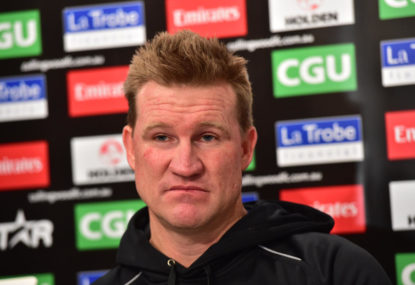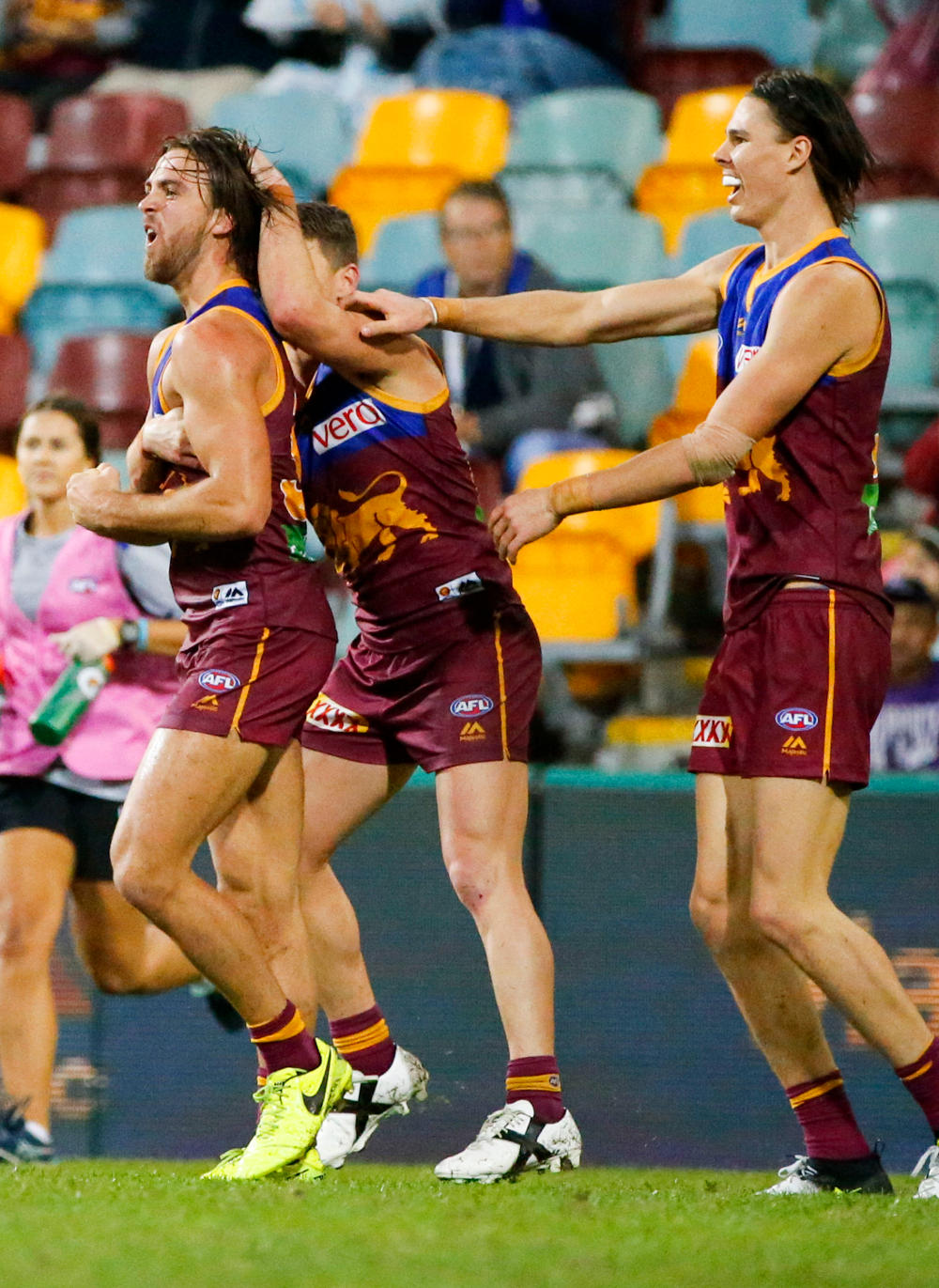LISTEN: Nick Larkey's note-perfect Damian Barrett impression leaves Sam Draper in stitches
North star Nick Larkey tried his impression of AFL journo Damian Barrett on the '200 PLUS' podcast and left Bomber Sam Draper in stitches.

On Footy Classified on Monday night, Craig Hutchison and guest panelist, Collingwood coach Nathan Buckley, argued about ‘door-stopping’ – effectively, players being ambushed for an interview. Hutchison wanted greater access.
Buckley defended that players should have their space. You had two sides of the argument – Buckley, a former champion of the game and current coach, and Hutchison, formerly a journalist and now in the media.
Hutchison kept falling back on the argument that clubs should throw open their doors to the media as an avenue of growing the game. At one point, Buckley challenged Hutchison as to whether his attitude was altruistic. Hutchison espoused how he was passionate about this topic. Well, I don’t know if ‘passionate’ is the right word. ‘Parasitic’ might be closer.
Let’s look at Hutchison’s altruism – clubs need to be open and available to media as a means of growing the game.
Tell me, who’s out there and not watching the game, not following it weekly, not really interested, who’s going to be converted because media have greater access to clubs?
Tell me, how exactly is challenging the clubs on the nitty gritty of their operations and exposing that to the public – and, as Buckley himself said, reframing the context through editing so soundbites are dramatic and engaging and become clickbait – going to endear it to the public?
And, finally, tell me, God almighty, tell me, how some five-year-old kid out there who plays a bit of footy, plays a bit of soccer, plays a bit of tennis, is going to be won over to make Australian rules his or her primary sport because the media have unlimited access to the clubs and all their linen?
This is the sense of entitlement in the media that I lamented back on 11th April.
It’s a simple equation. No, the game does not owe the media such as Hutchison and their ilk anything. The media owe the game for their livelihood, for their celebrity, and for their very existence. Without the game, where would they be? Nowhere. Without them, where would the game be? Doing fine, I imagine – just as it has done for over 150 years.
Obviously, the game has a symbiotic relationship with broadcasting. That’s always going to exist. Yes, the mainstream media helps promote the game. But the game – Australia’s national sport – provides mainstream media with news, ratings, sales, etc. Beyond how it exists now – and some of the reportage is already borderline – there’s no reason this relationship needs to be muckraking, needs to be sensationalising, needs to be (and I would say ‘for the lack of a better word’ if this word didn’t fit so perfectly) tabloid.
Broadcast the athleticism and competitiveness and the rivalry of the contest, and the game will sell and grow. Broadcast the beauty – and uniqueness – of a high mark, and the game will sell and grow. Broadcast the grace of a player sprinting down the wing, outrunning an opponent, and bouncing the ball several times before nailing a goal, and the game will sell and grow. Broadcast the naked bravery of two players with eyes only for the ball as they clash, and the game will sell and grow.

(AAP Image/Glenn Hunt)
This is what sells and grows the game. The game.
Hutchison demanding clubs be accessible to media, that they should throw open their doors for a Q and A on all things tawdry (and, let’s not kid ourselves, because this is the angle that sells papers – they wouldn’t be going in there for anything else) isn’t growing the game in any positive or constructive fashion.
As far as footballers go, obviously they’re celebrities, and with that comes an understanding that they will have to endure public scrutiny, that they will have to hold themselves accountable for x, y and z. At times interest will escalate to the point that something might need to be said publicly. But clubs should be allowed to dictate when and where and if that will happen.
Let’s take Mark Robinson, for example. Tweets insensitively about Collingwood’s Alex Fasolo and his depression, apologises following a backlash, and then requests an interview with Fasolo. When Collingwood – advised by medical experts – decline, Robinson goes ahead and emails Fasolo anyway. Well, there’s a sense of entitlement.
Tell me, how’s Robinson’s attitude growing the game? Because this is what Hutchison is saying. Let throw the doors open, damnit! Let’s get the news! Who cares at what cost?
Where do we draw the line? We get news. How much more is needed?
Is this what we want from our media, and the relationship we want to cultivate? If you were a parent of a kid going into football, is this what you’d want them exposed to? If you were a footballer who might have off-field issues, would you be comfortable in an environment where you knew that you are subject to examination no matter what?
I don’t think so.
Clubs owe us – their members, their fans – their best performance on the field, their best administration to run their club right, and the honesty to let us know they’re doing everything in their power to see that those things occur. They do not owe us more than that. And their players shouldn’t be stalked by the media, whether it’s door-stopped or not.
We live in a world growing increasingly connected and accessible, so the desire to have immediate and unrestricted access to any possible news as it happens is understandable, but while it’s might be understandable, it also gets to the point that we’re overstepping. We’re invading privacy. We’re tramping civil liberties.
And we’re not caring! Players – just like anybody – should be allowed space. They should be allowed the privacy to deal with whatever their issues are – be it personal problems, mental health, or a spot of bad form, or just the need for down-time – if they request it.
They shouldn’t have to live in fear of somebody trying to find their next headline.
And if the media – as people who should still be held to the standards of common human decency – don’t get that, they’re the problem, not the clubs.